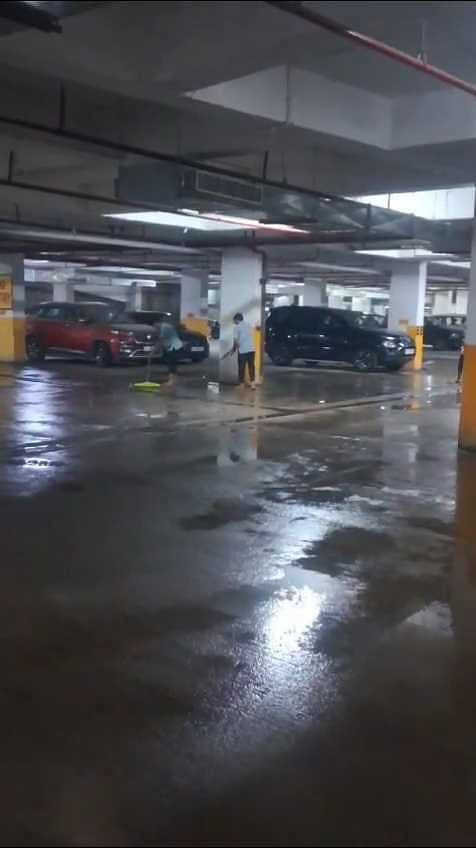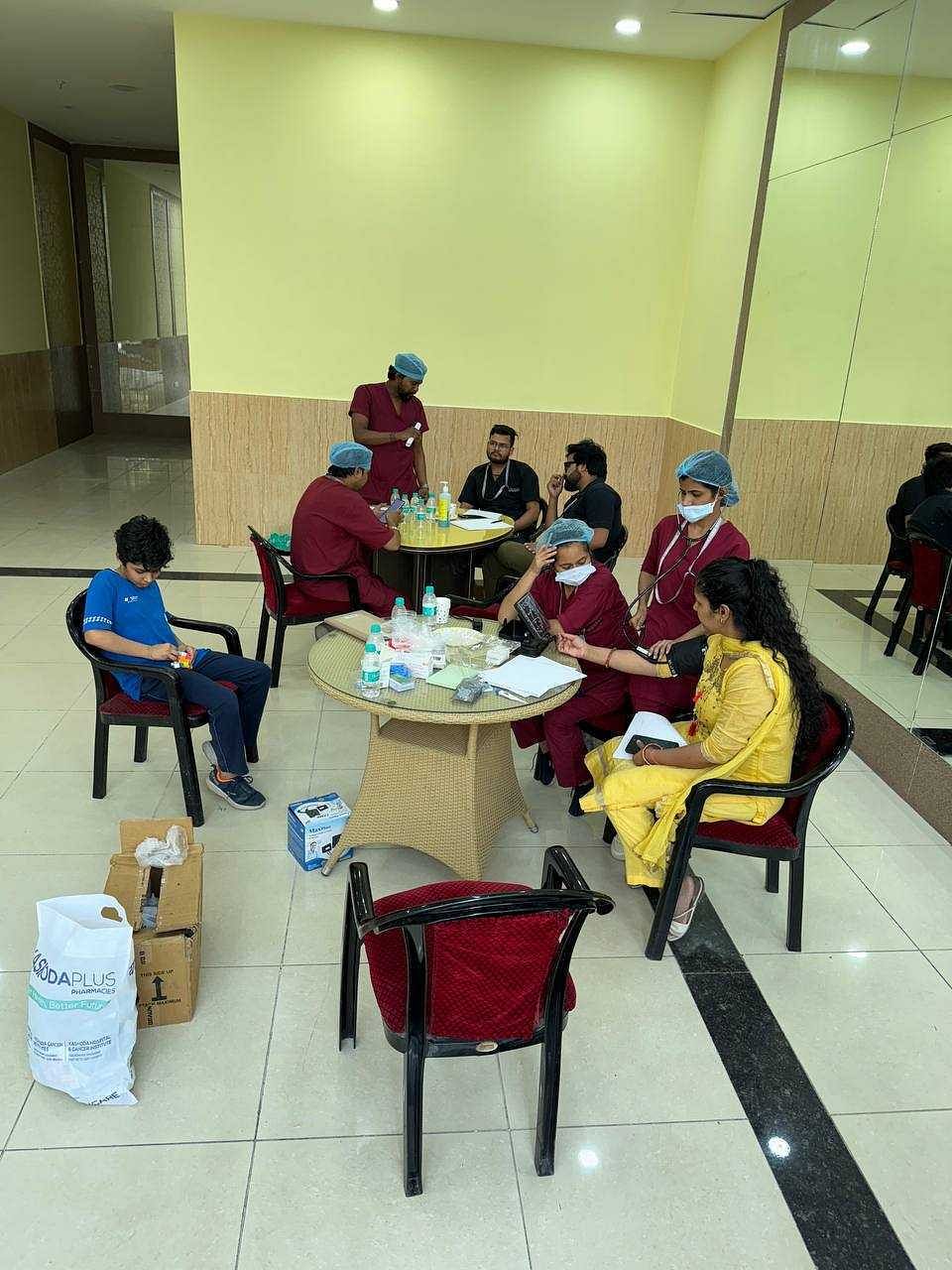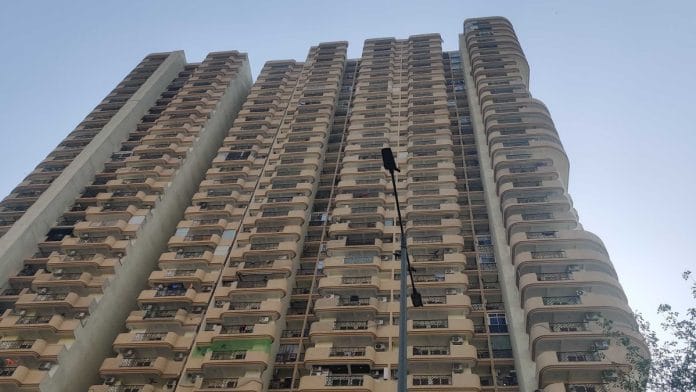Ghaziabad: More than 200 out of approximately 4,000 residents of the upscale condominium Saya Gold Avenue in Indirapuram, Ghaziabad, have fallen ill after sewer water allegedly contaminated their underground reservoir of drinking water last week. Children and senior citizens are severely affected.
“The basements are always overflowing with sewer water; there are high chances that this could be the reason behind the contaminated water,” said Sanjay Pandey, one of the residents of Saya Gold Avenue.
The residents’ WhatsApp and Telegram groups buzzed all week with news of families falling sick with vomiting, diarrhoea, and stomach and body aches. Residents anxiously shared details in the groups. Subsequently, the residents gathered to protest on the front lawns of the society on 2 May.
It took days for the foul-smelling water to be drained out of the underground parking lot of the condominium.

Under investigation
The residents informed ThePrint that there is no Resident Welfare Association (RWA) in Saya Gold Avenue. Everything is managed by the owner.
Saya Gold Avenue is owned by Vikas Bhasin, who is the chairman and managing director of Saya Homes. It is the largest apartment complex in Indirapuram, spread across 5 acres of land. The residential society consists of eight towers with 34 floors, and 1,620 flats. Bhasin has not visited the society, but according to the residents, the chief operating officer visited Sunday to apologise for the inconvenience and admitted it was a mistake on their part.
On Friday, Sanjay Singh, the councillor of Indirapuram’s Shipra Suncity ward, arranged for a team with the assistance of the Chief Medical Officer (CMO), Ghaziabad Development Authority (GDA), and Nagar Nigam to assess the situation.

“They collected 15-20 water samples for tests on Friday. There is no exact evidence that the water was contaminated due to the broken sewage pipeline; it is just speculation because our basement is always overflowing with sewage water. The report will be sent by the CMO’s team today,” Pandey added.
However, the GDA team found that the sewer line wasn’t damaged.
“The site was inspected by the contracted firm of Engineering Zone 6 and Assistant Engineer Piyush Singh. The morning and evening water was tested, and the maintenance team of the building present also tested the water. The sewer line was also checked by GDA and was not found to be damaged or overflowing anywhere,” Atul Vats, Vice President of the GDA told ThePrint.
Approximately 30-40 people, mostly children, were admitted to a hospital in Ghaziabad with vomiting, fever, and diarrhoea symptoms. “Five of us in the family have been experiencing symptoms of vomiting, fever, diarrhoea, and stomach pain. After about six-seven days and talking to others online, we learned that many others in the society have been affected as well,” said another resident Nivedita Chaturvedi.
Chaturvedi’s 12-year-old son was the first to show symptoms in her family. Two days later, her 14-year-old daughter also fell ill, followed by her mother-in-law, her husband, and then Chaturvedi herself.
“While my husband and I are recovering, my children and mother-in-law are still severely affected. When I took my kids to the doctor, I found out the cause was not heat stroke but rather contamination from food or water,” she added.
Also read: AAP, Congress workers caught in an awkward situationship in Delhi; bickering on the ground
GDA, faulty sewer line
While speaking to ThePrint, the maintenance team of the society said that they could not comment on the reason behind the crisis as the reports are yet to come. “We are waiting for the test results before saying whether it was due to water contamination. Regarding the issue of overflowing sewer water, there is no provision for Sewage treatment plants (STPs) in Ghaziabad. When the main sewer line becomes full, the sewer water from the high-rise building experiences a backflow, leading to overflow in the basement. Although we have installed a non-return valve (NRV) to control the backflow, the situation has improved over the past week,” said Lavanya, estate manager.
Like everywhere, residents of the society suspect that the builders took shortcuts when the complex was built. Singh believes that Saya Gold’s sewer facilities may have contributed to the situation. “The owner took advantage of the fact that STPs were not mandatory in Ghaziabad when the building went to market. Its absence is also a major reason if the water turns out to be contaminated in the report. It is very alarming. The GDA and the builder need to sit together and contemplate the issue,” Singh stated.
The backflow of sewage water is an issue for most high-rise buildings in Indirapuram. According to Deepak Kumar, who is the president of the Federation of Apartment Owners Association, Ghaziabad, and the Amrapali Village Apartment, Indirapuram, the GDA collects taxes but does not clean the sewer. “Sewer water overflow is an issue in my society too. This has been a problem in other societies as well. The GDA hardly regulates and responds by saying that they have no funds to do it,” Kumar said.
A team of government doctors is conducting a survey on-site. One of them, Akash Vats, told ThePrint that the main symptoms suggest water contamination as the cause. However, they are also awaiting the report to verify the claims.
(Edited by Ratan Priya)






